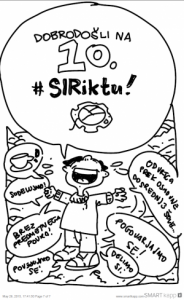Dragica B. Banović, Šolski center Novo mesto, Srednja elektro šola in tehniška gimnazija, Novo mesto
Metka Ban, Šolski center Novo mesto, Srednja zdravstvena in kemijska šola, Novo mesto
The updated curriculum for chemistry is designed to enable the realization of key competences for lifelong learning, which are defined as a combination of knowledge, skills and co-relations related to the context. What is of key importance in chemistry is the development of basic competences in science (science) and technology, mathematical competence and digital literacy. Furthermore, the curriculum for chemistry enables the implementation of a number of components of other key competences for lifelong learning, which include social and civic competences and communication in foreign languages. The desire for quality science knowledge makes teachers work with students to develop an interest in science content, paying particular attention to developing pupils understanding of the content of science subjects. In the process of acquiring knowledge with an understanding of the content plays an important role the use of so-called active learning approaches, including the project work (Ferk Savec, 2011). Project based learning is a teaching approach in which students acquire knowledge by studying interesting problems and defects. phenomena of everyday life. Upon learning project work the students acquire and upgrade their knowledge, develop skills, abilities and talents and strengthen their social skills. In the chemistry project work students from the 2nd year programme of Technical gymnasium Novo mesto were included. The project work took place in June when students had already acquired all the reviews on the subject and therefore the implementation was not time limited. The aim of the project work was to produce a summary and presentation of a selected topic in Slovenian and German language. Students used both, books and electronic resources, which were in Slovenian and German language. The starting point for the exploration of each topic was represented in the interactive textbook of Chemistry in the 2nd year, which was developed under the project “E-books focused on sciences in primary schools.” The transversal linking of chemistry with German enabled students to learn the chemistry content of selected areas of the properties of elements and compounds in biological systems, while advanced technologies enhanced team spirit, developed competence of learning to learn and work independently with the given resources. In addition, students were taught the correct and appropriate use of monolingual dictionary, as well as other reference literature in German lessons.
